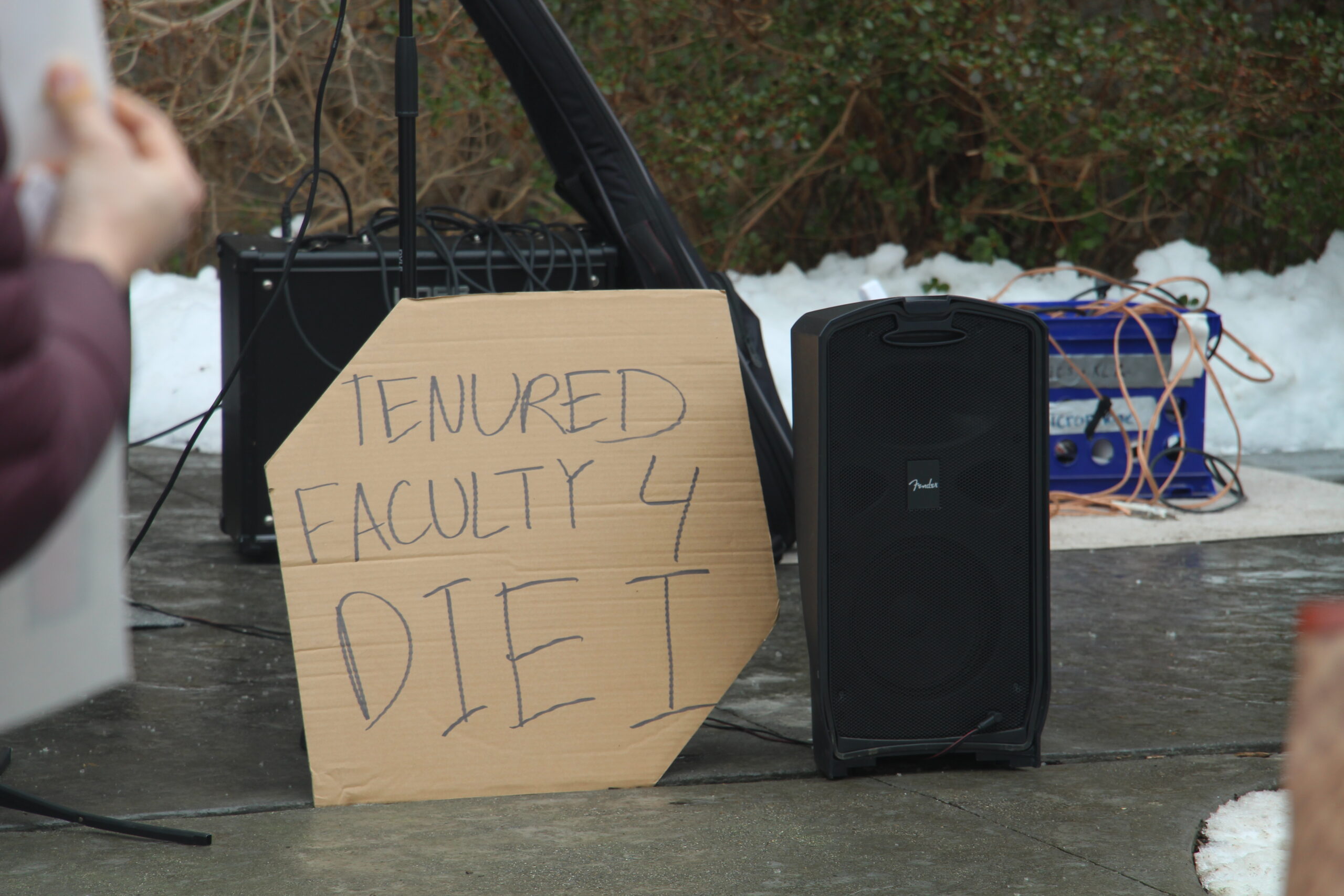In 2005, the Connecticut College faculty founded the Freshman Seminar program for three reasons: to broaden students’ horizons, develop their writing skills and offer the opportunity for a small introductory level class.
In brainstorming ways to make the freshman experience more comprehensive and involved, a group of faculty came up with the freshman seminar: a small class, based on the interests and passions of the professor teaching it, complete with discussion and writing components.
There are two distinctly different sides of the FYS story. The first is a brighter one, composed of students who will quickly say that they find their respective seminars effective and interesting.
Molly, a freshman in the seminar “Making Theater” with Professor Lowe, knows exactly why she likes her class so much: because the class had not been taught at the college before, Professor Lowe was “making it up” as they went along (in the best sense possible), and was actively including her students in this creation.
“It’s a great example of the professor working constructively with the students,” she said.
Another student, Quinn, is in the seminar “For Gods’ Sake” with Professor Brodkin, and enjoys “a nice opportunity to take a class I might otherwise not be able to.” She said, “freshman seminars are a piece of Connecticut College culture that I’ll look back on with fondness over the four years that I’m here.”
Quinn’s point exemplifies a key piece of the vision for the FYS: a class he might otherwise not have been able to take qualifies as a class that may be “broadening his horizons,” thus fulfilling one of the goals that freshman seminars were put in place to accomplish.
A third student, Maia, in the seminar “Immigration to the U.S.” with Professor Cole, explained that she enjoys the course because it is informative and relevant.
According to Maia, the seminar’s efficacy lies in the amount of feedback that the students in the class receive from their professor, which makes up for the fairly heavy, but not overwhelming, workload.
These three students seemed to look for similar traits in their classes: a manageable workload (“involved, but not overwhelming”), an interesting topic and a professor who gives ample feedback and gets to know students.
Residential seminars are also well liked, and allow freshmen to meet others in their house. Most students in these seminars find the FYS’s effective, confirming that for some, the administration’s goals for the seminars were being met.
While many students gush over their positive freshmen seminar experiences, others feel that they aren’t getting enough out of their classes.
Whether it is lack of interest in their topic or an absence of engaging material, many students find their freshmen seminars to be disappointing — not what they had expected, unhelpful, even stifling.
Freshman Meghan Rossini was able to get her first choice seminar: Critical Thinking and Psychology. Rossini explained that she was initially drawn to its interesting description on the school website and her desire to take a psychology class for the first time, especially with her interest in pre-med. However, so far the class is not what Meghan expected.
Instead of focusing on psychology, the class has been concentrating on critical thinking and its many steps.
“Although I am learning a lot, the topic is not very engaging,” she said. “It’s definitely the content matter that bothers me, not the teaching style. The teacher really tries to engage us, but the topic just doesn’t interest me.”
Many other students in the class expressed similar concerns to Meghan’s, as many of them too plan to go into a medical field. Instead of being able to discover if psychology is even an interest of theirs, they are learning about a subject that does not necessarily interest them. While the class’s discussions remain on critical thinking, Meghan remains optimistic that more psych will be introduced.
“The semester’s not over yet,” she quipped.
Another student, who chose to remain anonymous, was placed in her freshmen seminar only after she was denied her first choice. Her seminar, which is highly literature-based, is what she describes as, “basically sophomore year English class all over again.”
When choosing her seminar, she was looking to take a class on a topic entirely new to her. However, classes like “Meaning of Life” and “Chinese Music and Politics” were quickly filled to capacity with eager students also looking to broaden their horizons, leaving her with only one available seminar.
She explained that the emphasis on writing structure in the class is redundant to what she learned throughout high school, and elaborated that the class spent a week going over how to write an effective thesis.
“I know there are kids who need this type of writing help and who don’t know how to write effectively,” she said, “ but I know how to write a thesis and structure and essay. It can be helpful for some people but I just find it very redundant.”
She continued, “If people are able to get into Conn, they are already at a level of writing where they don’t need to go over the basics.” Pausing to think, she added, “While there’s always room for improvement, I don’t think we need the emphasis.”
When asked if her freshman seminar, a class whose purpose is to ease first year students into college level work, effectively helped her succeed in her other classes she responded, “I would be fine without it.”
Despite increased efforts to improve the FYS program, some students still feel that it isn’t enough.
A student in the Cuban Revolution seminar who has chosen to withhold her name feels that her seminar is a waste of her time. This seminar was not her first choice. Her first choice, “Science Technology and the Body”, was cancelled, leaving her with few options that related to her interest in medicine.
When asked if she as least liked the class she said, “Some of the discussions are interesting but it’s just not enough. I’m not really interested in the material and the workload has been ridiculous. The amount of reading is not doable for anyone.”
Instead of finding her freshmen seminar helpful, this student is finding it to be an incredible burden.
“This class,” she said, “made my first few weeks here a lot more stressful then they needed to be. I’m stressing about a class and is not even close to what I wanted.”
Though it may not seem apparent to some unhappy students, the college is very conscious of assessing and improving these classes.
When a professor devises a potential FYS, either by his or her own accord or by the request of a department, it is first brought before the department that is “sponsoring” the course. The department makes suggestions for, asks questions about and thoroughly reviews the course. They make sure that the new course fits in with the needs of the department (satisfies a major or minor, for example) and that it has an overall value to the general curriculum.
After this process of review, the course is sent to the Academic and Administrative Procedures Committee (AAPC). Usually, if the AAPC has questions about the course at this point, they are minor because of the thoroughness of the departmental review and the form through which the course is submitted.
If the course passes this second round of examination, which it almost always does, it is sent to the faculty for one final review, and then becomes an official course.
This entire review process happens before course registration begins. Throughout the semester, the Center for Teaching and Writing hosts an array of workshops and check-in points for the professors teaching FYS’s in order to make sure that goals are being met, as well as to give professors an opportunity to confer with each other.
At the end of each fall semester, a survey is sent out to all freshmen asking about their experience with their respective seminars. After all these measures, it is hard to understand how students find problems with their seminars at all – and how these problems were not caught and dealt with far before the first day of classes.
According to Dean Ammirati, these FYS surveys have a significantly high return rate, indicating that the information taken from them is likely accurate.
Surveys say the seminars are effective, and the majority of freshmen are happy with their FYS experiences.
They also indicate that student satisfaction goes up even higher with residential seminars and when the professor is also the students’ advisor.
It’s nearly impossible to have 100 percent of the seminars taught by a student’s faculty advisors, but the percentage continues to climb.
“The satisfaction with these seminars is real,” said Dean Ammirati, “and I think that there is a wide enough range of courses for everyone to find something that they like, even if maybe they weren’t sure about it in the beginning.”
Surely, the administration also takes into account the negatives of the surveys, and is always trying to look for new ways to improve the classes. Overall, though, the majority of FYS’s are doing their jobs — whether some students like them or not.










